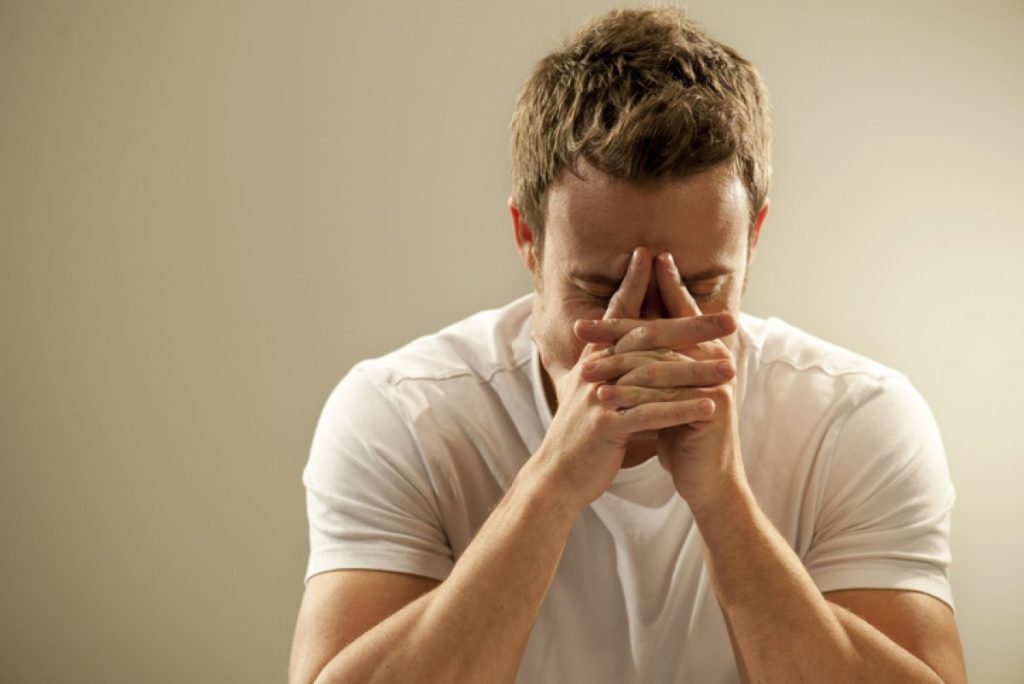If you are having anxiety and think low testosterone could be the cause, you might be right. Many men suffer from anxiety because of hormonal imbalances, and low testosterone levels are often the cause. The good news is that you can get back to feeling like yourself with good treatments.
Male growth and your health are very much influenced by the essential hormone testosterone. Testosterone has a big influence on your mental health, including your mood and anxiety levels. Next to that it helps you gain muscle and increase your sex drive. Increased anxiety is one of the many psychological symptoms that can result from testosterone levels falling below normal levels.
What Connection Exists Between Anxiety and Low Testosterone?
Anxiety and low testosterone have a complicated relationship that are very interconnected. Low testosterone can increasy anxiety symptoms in the following ways:
The Effect of Testosterone on Brain Chemistry
In the brain, testosterone helps in the regulation of neurotransmitters like serotonin. Because it helps with mood stabilization, serotonin is referred to as the “feel-good” hormone. Anxiety, anger, and sadness might be caused by a decrease in serotonin caused by low testosterone levels.
The Stress Response and Testosterone
Testosterone also helps with the regulation of the body’s reaction to stress through its relation with the hypothalamic-pituitary-adrenal (HPA) axis. Cortisol and other stress hormones are produced under the control of this system. Low testosterone levels can cause disregulation of the HPA axis, which can lead to an excessive stress response and a higher anxiety.
The Neuroprotective Effects of Testosterone
Testosterone helps keep cognitive function and brain health because of its brain-protecting effects,. These protective functions may be weakened by low testosterone levels. That leaves the brain more vulnerable to stress and anxiety.
Typical Signs of Low Testosterone Anxiety
Anxiety can show in physical and emotional symptoms. A range of anxiety symptoms might negatively impact a man’s quality of life if he has low testosterone. These signs may be, research suggests:
- Constant anxiety, fear, or discomfort
- Having difficulty focusing and making choices
- Mood fluctuations and irritability
- Anxiety and trouble relaxing
- Issues with sleep, such insomnia or restless nights
Signs of Low T Anxiety in the Body
Physical signs of anxiety because of low testosterone might also include:
- Irregular heartbeat and a fast heartbeat
- Shaking and sweating
- Tension and pains in the muscles
- Problems with digestion, such as nausea and upset stomach
- Low energy and fatigue
Without the proper care, these physical symptoms can worsen the psychological suffering caused by anxiety. That results in a cycle that may be difficult to escape.
Who Is at Risk for Anxiety Caused by Low Testosterone?
Low testosterone and its connected anxiety symptoms can affect any man, but some conditions can make it more likely:
Age
As people age, their testosterone levels normally go lower. That usually begins at age thirty. Men are more vulnerable to anxiety because of lower testosterone levels as they age into their 40s and 50s.
Hypogonadism and Other Hormonal Disorders
Anxiety symptoms are more common in men with hypogonadism. That is a disorder where the body produces low amounts of testosterone. Anxiety can also be caused by other hormonal disorders, such as those affecting the thyroid or adrenal glands.
Chronic Health Conditions and Obesity
Lower testosterone production may come from being overweight or obese. Low testosterone and an elevated risk of anxiety have also are connected to long-term medical disorders such as diabetes, metabolic syndrome, and cardiovascular disease.
Lifestyle Factors
Anxiety is more likely when testosterone levels are negatively impacted by a certain lifestyle. These are:
- Lack of exercise
- Not enough sleep
- A lot of stress and high cortisol levels
- unhealthy diet
- A lot of smoking and alcohol use
Positive lifestyle changes can lower the change of low testosterone-induced anxiety and give men healthy testosterone levels.
How is Anxiety Due to Low Testosterone Diagnosed?
An evaluation by a medical professional is the first step in diagnosing anxiety because of low testosterone. Discussing your symptoms, how long you’ve been experiencing it, and any further physical or emotional changes you’ve seen, is the first step.
After that, your doctor will check you physically to check for symptoms of low testosterone. He can look at changes in hair growth patterns, increased body fat, and decreased muscle mass. Because low T can make those worse, they can also talk about your energy levels, sex drive, and erectile function.
An important part of the diagnostic process is blood testing. To see whether your total and free testosterone levels are within the normal range, your healthcare provider will take measurements.
Apart from checking your testosterone levels, your doctor might also check for mental health conditions like depression or generalized anxiety disorder. That disorder could happen with anxiety and can grow or cause anxiety symptoms.
Eliminating Alternative Reasons for Anxiety Symptoms
It is critical to rule out other possible reasons for your symptoms when the doctor looks at your low testosterone-related anxiety. The following are some illnesses that might look like or worsen anxiety:
- Thyroid conditions, particularly hyperthyroidism, can cause anxiety, restlessness, and a fast heartbeat.
- Cushing’s syndrome and other adrenal gland disorders can cause mood swings, anxiety, and irritability.
- Too low vitamin levels can cause higher levels of anxiety and depression, especially low vitamin D levels.
- Heart issues or respiratory disorders like asthma or arrhythmias can produce physical symptoms that look like anxiety.
- Substance abuse or adverse drug reactions, since some substances can cause or exacerbate feelings of anxiety
Your doctor can make a good diagnosis and design a customized treatment plan by looking at these possible causes.
Which Therapies Are Best for Low Testosterone Anxiety?
Low testosterone-related anxiety is treated a lot with different strategies that take into account both the psychological symptoms and the physiological imbalance. The following are the most successful treatment options:
Therapy for Testosterone Replacement (TRT)
For males with low testosterone levels, TRT is a popular treatment. Exogenous testosterone supplements are used to bring the body’s levels back within a healthy range. There are several ways to deliver TRT, including:
- Intramuscular injections: Usually given every one to two weeks, testosterone is injected straight into the muscle.
- Transdermal patches or gels: These techniques make the skin absorb testosterone.
- Pellets: Under the skin, tiny testosterone-containing pellets are surgically placed. Over the course of several months, the hormone is released.
TRT can improve mood, energy levels, and general quality of life by raising testosterone levels and it can also help reduce anxiety symptoms linked to low T.
Psychotherapy
Low testosterone anxiety may be treated with psychotherapy, especially cognitive-behavioral therapy (CBT). The goal of cognitive behavioral therapy (CBT) is to recognize and address the harmful thought patterns and actions that fuel anxiety. Men can better control their anxiety symptoms by learning coping mechanisms, relaxation methods, and problem-solving techniques in treatment.
Changes in lifestyle
Changes in lifestyle healthy changes can maintain related symptoms of low testosterone treatment and anxiety. These changes include:
- Regular exercises.
- Healthy eating
- Stress management
- Adequate sleep
Medication
Medication can be used in sometimes to help control with the symptoms of anxiety. People with anxiety may benefit from the use of antidepressants, such as selective serotonin reuptake inhibitors (SSRIs). But it’s important to remember that these drugs may also have sexual adverse effects.
Based on your needs, symptoms, and general health, your doctor will talk with you to choose the best course of therapy. The best method of treating anxiety associated with low testosterone is usually a combination of therapies, including psychotherapy, TRT, and lifestyle changes.
Low Testosterone and Anxiety: Frequently Asked Questions
How is anxiety related to low testosterone?
Anxiety is a common symptom of low testosterone, affecting a a lot of men with hypogonadism. Studies suggest that up to 23% of men with low testosterone may experience symptoms of anxiety. Anxiety has several causes, so a full evaluation by a doctor is necessary to check if low testosterone levels are a factor.
Can treating low testosterone improve anxiety symptoms?
Yes, treating low testosterone levels with testosterone replacement therapy (TRT) can help relieve anxiety symptoms in a lot of men. By restoring testosterone levels to healthy levels, TRT improves mood, reduces irritability, and promotes a sense of well-being. But every person reacts different to the therapy, and some men may require more interventions such as psychotherapy or medication to completely eliminate anxiety.
Does testosterone replacement therapy come with any risks?
TRT is usually seen as safe when used under the supervision of a doctor. But there are a few possible risks to be mindful of. These risks could include enlarged prostate, sleep apnea, acne, and a higher risk of blood clots. To guarantee the safety and efficacy of the treatment, routine monitoring with blood tests and follow-up checks are necessary.
How long does it take to see improvements in the symptoms of anxiety with TRT?
How low a persons testosterone levels are, can affect how long it takes to see improvements in anxiety symptoms with TRT. After beginning treatment, some men might feel better after a few weeks, while others might not see any changes for months. During the therapy, it is critical to be in constant contact with your doctor in order to monitor your progress and make any required changes.
Can lifestyle changes help reduce low testosterone and anxiety?
Yes, making healthier lifestyle choices can help address low testosterone and the anxiety symptoms that go along with it. A lot of exercise, especially resistance training, can naturally raise testosterone levels. Improved testosterone levels and decreased anxiety can also result from getting good sleep, controlling stress with relaxation techniques, and eating a balanced diet full of nutrients like zinc and vitamin D. It’s important to get advice from a trained doctor if you’re seeing signs of anxiousness and low testosterone.

